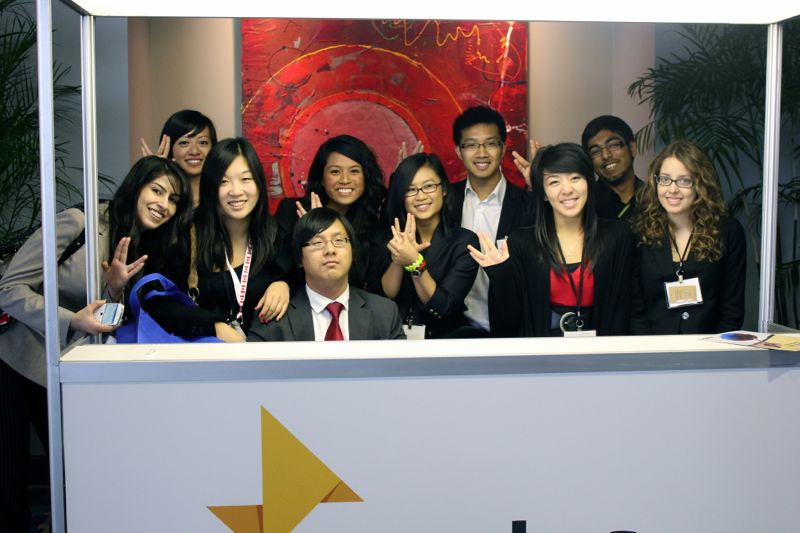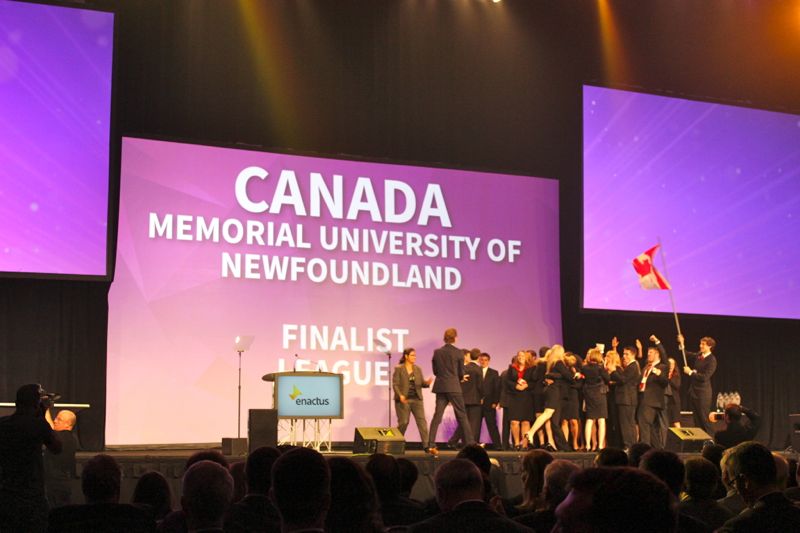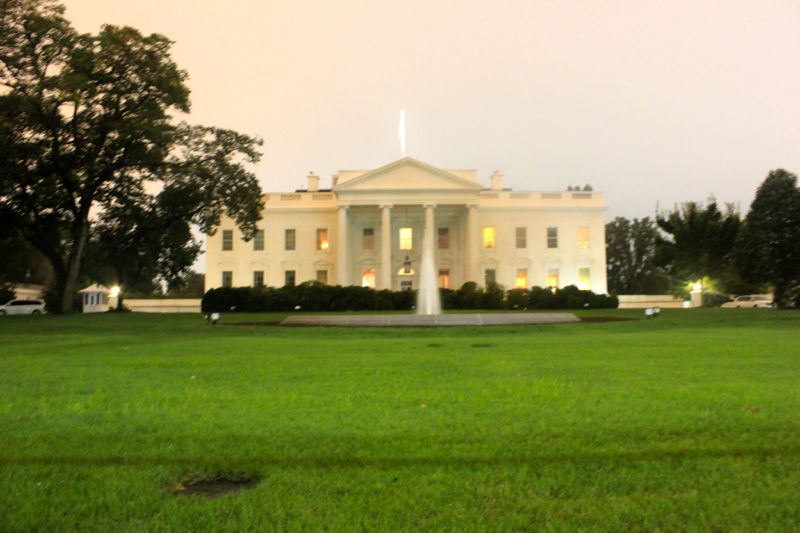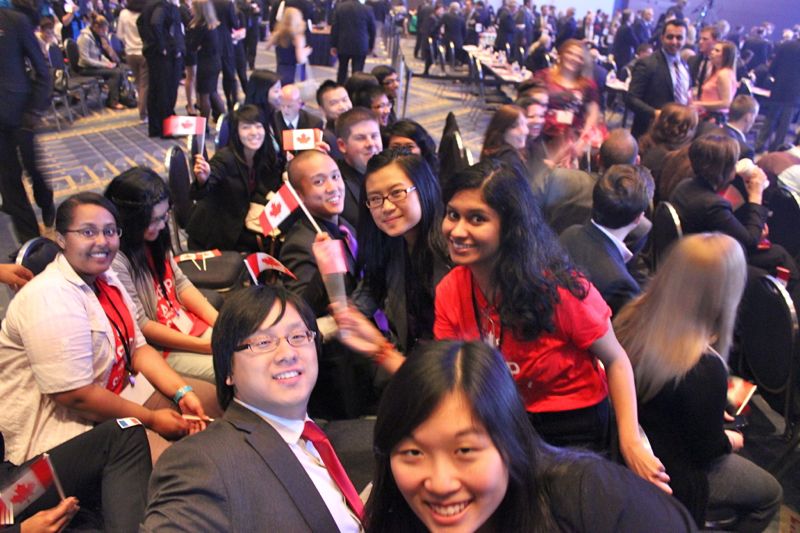After an exciting opening round of competition, Day Three brought about the conclusion of the Enactus World Cup in spectacular fashion. With the field narrowed to sixteen teams, one day of competition was all that stood between each remaining country and the Alvin Rohrs World Cup trophy.
The semi-final round of competition saw four leagues, each with four teams, presenting once more to a larger judging panel of industry professionals than the opening round. With only one team from each league moving on to the finals later that day, it was do-or-die for each team. Many teams showed improvements from their initial presentations the day previous, and it was clear that each team’s passion for their work was the intrinsic motivator of their efforts. The quality of programs that each team undertook was undeniably impressive, inspiring each person in attendance through each team’s innovative approaches to changing the world as we know it. It was interesting to see that some teams had already altered their presentations to include references to Enactus, the organization’s new name, which showed great adaptability.
The awards ceremony for the semi-finals was bittersweet; while four teams advanced to the finals, twelve hard-working teams had their dreams of winning the Enactus World Cup cut short. After a brief speech from Dr. Rajiv Shah from USAID, and some great videos to hype up the crowd, an award was given to presenting sponsor KPMG. The Global Champion award aimed to thank the organization for how much they have done to support Enactus ever since it was founded. It was then time to find out the results; the teams moving on to the finals were the United States, Zimbabwe, Egypt and India. Despite a year of hard work and a great presentation, Canada’s Memorial University of Newfoundland unfortunately did not get to move on to the finals. The Canadian delegation was incredibly supportive of our presenting team during this tough time, while remaining gracious in our defeat and applauding the amazing work of the remaining teams.
After a short break, the finals were ready to begin. The presentation order for the final round of competition was Egypt, Zimbabwe, the United States, and finally India. With a panel of around one hundred judges, as well as an audience of over 3,000 individuals, the pressure was on to blow everyone away and the teams did just that. The programs that the top four teams undertook were incredible, to say the least. Egypt ran many programs, but one of their most interesting was a program based around aquaculture. Filtered by Nature found that a species of fish in an Egyptian lake was slowly being devastated due to pollution, killing 48 percent of the species to die and drastically reducing fish stocks for farmers. By introducing a new species to the lake, that helped to clean up this pollution, the lake ecosystem was drastically cleaned up and fish stocks began to replenish, increasing the income of these fish farmers significantly and allowing them to remain in their current trade. India ran a program that brought lighting to rural Indian slums, targeting over 100 villages in the 2011/2012 year alone and impacting the lives of tens of thousands of Indian citizens. The United States presented on one of its core programs, Spring Back, which employs convicted felons, who have been recently released from prison, to take apart old mattresses so that each component can be recycled rather than having the whole mattress tossed into a landfill. This program was one of the strongest in the entire competition and targeted all areas of the triple-bottom line in a clear and impactful way.
After these four amazing presentations, coming up with an overall winner would clearly be a tough task for the judges. The final awards ceremony began with Fatma Sirry, leader of Enactus Egypt, winning the Jack Shewmaker award for her amazing contributions to the organization and her numerous fundraising efforts to support the organization. Enactus Worldwide President and CEO, Alvin Rohrs, then took the stage and shared his vision for the future of the organization. We left the speech feeling like the sky is the limit and that Enactus will be a major player on the world stage over the next few decades. The results were then announced. Zimbabwe placed fourth, while India placed third. The runner-up was Egypt, making the United States the winner of the 2012 Enactus World Cup! The honour was well-deserved, but all of the top four were winners in the audience’s eyes.
After the Enactus World Cup officially concluded, our team had one final dinner together in Washington, D.C. We were lucky to have Rosanne, the Beedie School of Business’ Manager of Student Engagement and Recruitment, join us at the World Cup. Rosy and her husband Adrian joined us for dinner at Clyde’s, where we celebrated their recent marriage and the amazing event that we all had attended for the past three days. The day ended with an official after party, hosted by The Home Depot at Washington’s Club Ibiza. This was an awesome chance to see everyone for one last time, and seeing the diverse number of people from all around the world was incredible. While everyone enjoyed the opportunity to dance the night away, there was one final surprise for attendees. At the stroke of midnight, the announcement of a special guest was made. The crowd was then treated to an amazing twenty minute performance by The Jabbawockeez, an incredibly talented and popular dance crew who are best known for winning season one of America’s Best Dance Crew and easily recognized for their signature white masks. It was an amazing way to end the trip, to say the least.
It was an absolutely incredible week that we wouldn’t trade for the world. Look out for more blogs about our trip to the Enactus World Cup in the next few weeks, which will look at lessons learned, what each attendee thought of their experience, as well as some of the competing teams and the programs that helped propel them to success on the international stage.
 Spencer Toth is a fifth year student in the Beedie School of Business, studying Marketing, Human Resource Management, and Entrepreneurship & Innovation. He has extensive experience with student organizations, having been involved with Enactus SFU as both a member and executive, recently finishing his term as Director of Community Engagement, and he also spent a year as President of SFU Social Media Network. This whirlwind year ended with him receiving the Surrey Board of Trade’s Top 25 Under 25 award. He is currently completing a co-op term in Beedie’s Student Engagement Office, competing on SFU’s Human Resources team for JDC West, and acting as a FROSH Leader and Captain for BASS FROSH.
Spencer Toth is a fifth year student in the Beedie School of Business, studying Marketing, Human Resource Management, and Entrepreneurship & Innovation. He has extensive experience with student organizations, having been involved with Enactus SFU as both a member and executive, recently finishing his term as Director of Community Engagement, and he also spent a year as President of SFU Social Media Network. This whirlwind year ended with him receiving the Surrey Board of Trade’s Top 25 Under 25 award. He is currently completing a co-op term in Beedie’s Student Engagement Office, competing on SFU’s Human Resources team for JDC West, and acting as a FROSH Leader and Captain for BASS FROSH.



